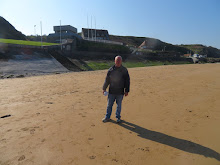Seventy five years ago, on June 6, 1944, the Allied forces (ABC--Americans, British and Canadians ) landed on five D-Day beaches and wrenched back Europe into light from the darkness it had descended into under Hitler. Starting closest to Paris, on the most direct line into the heart of Germany to end the scourge of Nazism was Sword beach (british), Juno beach (Canadian), Gold Beach (British), Omaha beach (American) and on the Cotentin peninsula, Utah beach (American). (Desperate moments on Omaha beach 75 years ago.)
The British were supposed to take Caen, the Norman capital with its important road junctions out of the confining bocage country and into open tank country, on the first day but they failed to do so and hard fighting lay ahead for the rest of the summer in Normandy as German armored reinforcements steadily came on to be engaged in a stalemate by the British and Canadians as the Americans loaded up a "right punch" to finally break out of Normandy at the end of August. Certainly Operation Overlord was no sure thing, it was a close thing perhaps, there was no Plan B if the landings failed, and what I discerned from tramping over the beaches for two days was how far apart the beaches were and how, with a little luck and a better performance by the Luftwaffe, the Germans might have exploited the initial gaps between the five beachheads and driven the Allies into the sea in piecemeal fashion. (The long walk in from the low tide point on Gold beach.)
The most success was had at Gold beach as the British Green Howards drove almost to Bayeux the first day and established a firm lodgment with some depth, although not as far inland as the plans called for. The three Allied Airborne units sowed confusion in the German rear and prevented coherent counterattacks on the beaches, and the Americans poured ashore on Utah beach where they met negligible resistance thanks to an effective naval and air bombing that worked as planned there alone amongst the five beaches. (A Green Howard at rest on the tip of the spear on the evening of the Longest Day.)
Tragedy ensued on Omaha beach as the first wave was slaughtered, and off Juno beach as SS troopers systematically executed Canadian POWs in cold blood at Ardenne Abbey. But our forces prevailed and it was very poignant to spend two days walking in the footsteps of heroes and giants on the beaches and battlefields and in the cemeteries there. (The Price. The Canadian cemetery, one of many Allied cemeteries in Normandy.)
Subscribe to:
Post Comments (Atom)





No comments:
Post a Comment